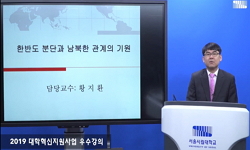이 글은 냉전의 역사적 경험으로부터 미중 전략경쟁 시대의 한국외교에 대한 교훈을 찾아보려는 시도이다. 냉전의 초기 전개 과정과 비교해 볼 때, 미중 경쟁이 아직은 본격적 냉전의 단계...
http://chineseinput.net/에서 pinyin(병음)방식으로 중국어를 변환할 수 있습니다.
변환된 중국어를 복사하여 사용하시면 됩니다.
- 中文 을 입력하시려면 zhongwen을 입력하시고 space를누르시면됩니다.
- 北京 을 입력하시려면 beijing을 입력하시고 space를 누르시면 됩니다.

미중 경쟁과 한국의 대응: 냉전의 역사로부터 교훈 찾기 = U.S.-China Competition and Korea’s Response: Some Lessons from the Cold War History
한글로보기https://www.riss.kr/link?id=A109038500
-
저자
마상윤 (가톨릭대학교)
- 발행기관
- 학술지명
- 권호사항
-
발행연도
2022
-
작성언어
Korean
-
주제어
Cold War ; Korean Diplomacy ; Security Dilemma ; U.S.-China Competition ; 냉전 ; 미중 경쟁 ; 안보 딜레마 ; 한국외교
-
등재정보
KCI등재
-
자료형태
학술저널
- 발행기관 URL
-
수록면
115-152(38쪽)
- DOI식별코드
- 제공처
-
0
상세조회 -
0
다운로드
부가정보
이 글은 냉전의 역사적 경험으로부터 미중 전략경쟁 시대의 한국외교에 대한 교훈을 찾아보려는 시도이다. 냉전의 초기 전개 과정과 비교해 볼 때, 미중 경쟁이 아직은 본격적 냉전의 단계에 진입하지 않았다. 미국과 중국, 그리고 관련국들은 과장된 위협인식과 과도한 대응으로 긴장을 고조시키지 않도록 조심해야 한다. 미소 냉전에서 그러했듯 미중 경쟁에도 안보 딜레마가 작동하고 있는바, 딜레마의 신중한 관리도 필요하다. 냉전기 한국외교에는 동맹, 자주, 외교 다변화의 전략적 선택이 있었다. 미중 경쟁 상황에서도 한국은 한미동맹을 통해 미국이 제공하는 확장억제력이 필요하다. 한국은 중국과의 관계를 고려하여 미국이 추진하는 동맹 네트워크에 포함되는 것을 꺼려왔으나, 미중 관계의 지속 악화 시 한중관계의 일정한 위축은 불가피하다. 그러나 미중 관계의 악화를 예단하기보다 추이를 잘 살펴 대응해야 하고, 우리의 외교 원칙 공표, 레버리지 확보, 취약성 보완 등 철저한 대비가 우선 필요하다.
다국어 초록 (Multilingual Abstract)

This article attempts to draw some lessons from the Cold War history for Korean diplomacy in the era of U.S.-China strategic competition. When compared to the early development of the Cold War, the current competition does not seem to reach a cold war...
This article attempts to draw some lessons from the Cold War history for Korean diplomacy in the era of U.S.-China strategic competition. When compared to the early development of the Cold War, the current competition does not seem to reach a cold war phase in full swing. The United States, China and other countries should caution themselves against heightening the tension out of exaggerated threat perception and with overreaction. Security dilemma lies at the dynamics of U.S.-China competition as it was in the Cold War. The concerned countries should carefully manage the dilemma rather than trying to solve it once and for all. During the Cold War, Korea’s diplomatic toolbox had three strategic options: alliance, self-reliance, and diplomatic diversification. Under the current circumstances, Korea continues to need U.S. extended deterrence. Although Korea has been reluctant to get involved in the U.S.-led network of alliances, it had to accept that, if U.S.-China relations further deteriorate, the contraction of the Korea-China relationship would be somewhat inevitable. Watching closely the trend of U.S.-China relations, Korea should make its principles public, obtain leverages and reduce vulnerabilities before it has to make a strategic choice.
동일학술지(권/호) 다른 논문
-
한반도 국제관계, 1972-2022: 시공간 복합체 시론
- 경남대학교 극동문제연구소
- 이혜정
- 2022
- KCI등재
-
- 경남대학교 극동문제연구소
- 김명섭
- 2022
- KCI등재
-
한국 외교정책 50년의 검토와 평가: 중소국 외교론의 관점에서
- 경남대학교 극동문제연구소
- 김태현
- 2022
- KCI등재
-
- 경남대학교 극동문제연구소
- 박철희
- 2022
- KCI등재




 KCI
KCI DBpia
DBpia






